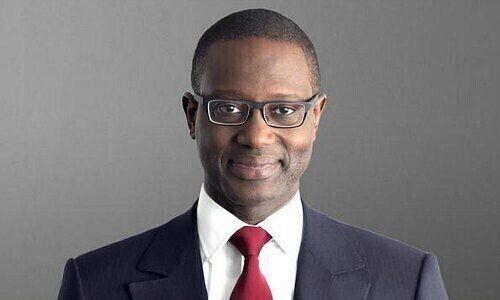A former CEO of the failed Credit Suisse washes his hands of responsibility in a guest article for the Financial Times. He leaves no doubt about his successes, however.
After his inglorious departure from Credit Suisse in early 2020 over an espionage scandal, Tidjane Thiam turned his back on the banking industry and embarked on various endeavors from investing in shell companies known as Spacs to taking part in a Hollywood film project.
Following UBS's emergency rescue of Credit Suisse, Thiam reflects on his time as CEO of the troubled bank. In a personal retrospective for the «Financial Times» (behind paywall), he gives his tenure a good report card and distances himself from the bank's downfall.
No Word on Espionage Affair
Nowhere does he mention his farewell package of some 30 million Swiss francs ($32.8 million), which the board of directors awarded him following a spying affair involving several former members of the bank's management coming to light.
Nor does he mention that after his departure, the Swiss Financial Market Supervisory Authority (Finma) criticized significant governance shortcomings at Credit Suisse and an inappropriate corporate culture in operational management.
Notwithstanding such failings, Thiam comments at length on the concept of risk, which he says has always been a priority for him at Credit Suisse.
Patting Himself on the Back
Thiam says he strengthened Credit Suisse's balance sheet, which was the worst on the list of systemically important banks when he took office, with 10 billion francs of equity. He addressed billions of francs of legacy issues in the mortgage market, among others, and eliminated more than 100 billion francs of bad assets.
He said it was also clear to him that risk systems would have to be renewed in a ten-year undertaking. «A few days into the role, one of my first decisions was to approve $150mn of new investment in risk management systems,» while increasing compliance staff by over 40 percent, he wrote.
Successful Culture Change
Until risk and compliance systems were significantly improved, Thiam's focus was on proper behavior and culture at the bank. By listing his merits, he wants to leave no doubt that he succeeded in turning things around. Because of his efforts, Credit Suisse managed to get through 16 quarters without serious problems and generate wealth management inflows of more than $200 billion, while reducing risk and cutting operating and legacy costs. «By 2019, Credit Suisse was making nearly as much profit as its new owner UBS. Its current plight saddens me,» he wrote.
He did devote some space in the article beyond congratulating himself, and offering advice on how to make the takeover work in Switzerland. Regulators should reconsider whether to allow a single domestic player of its size in the Swiss market.
Reputational Damage for Switzerland
If the Swiss universal bank were to be absorbed, Thiam suspects that thousands more investment banking jobs would be lost on top of those already expected. Thiam also criticizes the supervisory authorities for their application of the emergency law. Despite thousands of man-hours spent since the 2008 banking crisis, work on resolution plans must continue. The demise of Credit Suisse illustrates authorities' responses were not transparent enough, he said.
More Expensive Capital Raising
Of concern is Thiam's assessment that policymakers need to boost investor confidence in the European banking sector. The treatment of additional tier 1 (AT1) bondholders created considerable uncertainty, Thiam judges. As a result, the courts are likely to grapple with lawsuits over these subordinated bonds for years to come.
Ultimately, this important market for European banks is likely to make refinancing more expensive. In the end, American and Asian competitors could emerge stronger from all this.



































